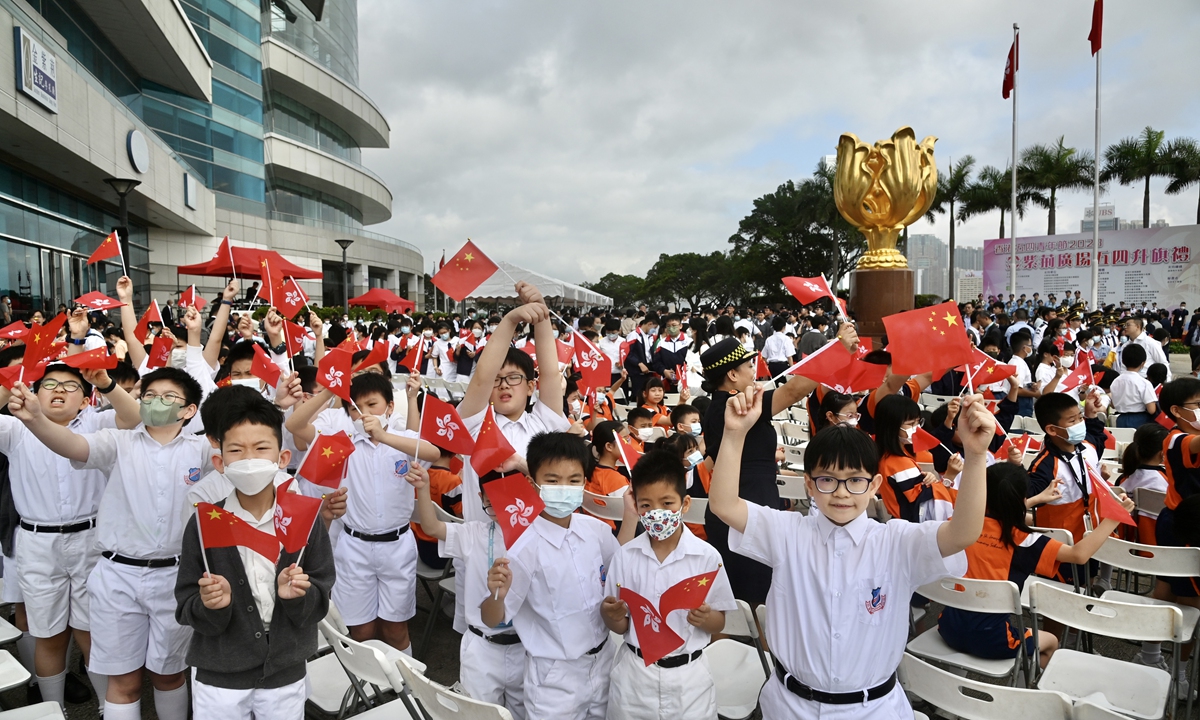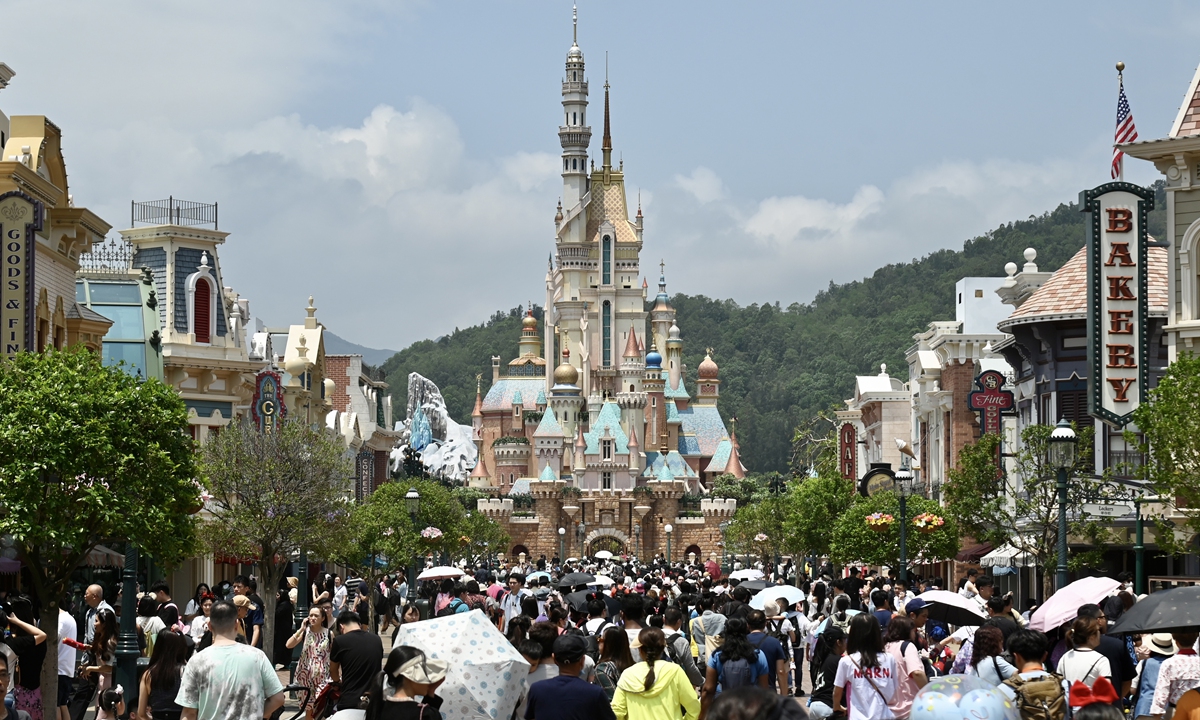
Students in the Hong Kong Special Administrative Region take part in the flag-raising ceremony of the National Youth Day at Golden Bauhinia Square in Hong Kong on May 4, 2023. Photo: VCG

A large number of tourists visited Hong Kong Disneyland on April 28, 2023.
Chinese immigration authorities announced to fully resume quick customs clearance procedure at ports and roll out measures to make traveling between the Chinese mainland and the Hong Kong and Macao special administrative regions (SARs) easier, starting from Monday, in a bid to facilitate personnel exchanges between China and the SARs and promote China's opening-up to the world.
The full resumption of quick customs clearance procedure at ports across China implies past travel measures which were done via manual inspection channels - including scanning health QR code, checking body temperature and reporting their travel histories to COVID-19 related countries - will be scrapped, observers noted.
The move thrilled travelers, businesspeople and students as they now can easily scan their faces and swipe passports or permits in seconds to pass the border. It was especially received with wide applauses from frequent travelers who commute between Hong Kong and the mainland cities as many optimized measures this time are targeting travels to Hong Kong.
A wide range of residents can enjoy quick customs clearance at ports, including Chinese residents holding Chinese passports or the permit for travel to and from Hong Kong and Macao SARs and foreigners who hold foreign passports or the permanent residence permits, the
National Immigration Administration (NIA) said in a release.
Observers said the optimized measures are of great benefit to further unleash great potential in domestic consumption, enhance the pattern of high-level opening-up, and they have positive projection toward China's economy in tourism-related fields as a locomotive of the international economy.
"The measures will greatly facilitate cross-border business, study, travel, consumption and family visits. Sectors including foreign trade and cross-border e-commerce will directly benefit," Chen Jia, an independent analyst on global strategy, told the Global Times on Thursday.
Prior to March this year, the international academic circle had a low expectation toward Chinese consumers, but consumption in the past months clearly shows China consumers' robust expectation, in particular, the increased consumption in Southeast Asian countries during the May Day holiday has made many countries see the huge potential of Chinese tourists in spending, Cao Heping, an economist at Peking University, told the Global Times.
Because of the fast economic boom in the post COVID-19 era, the rest of the world is opening up to China. In response to this change, China is also optimizing its measures, Cao noted.
Xu Xiaolei, marketing manager at China's CYTS Tours Holding Co, said his company is stepping up efforts to launch more inbound tourism products to meet the market demand. "The speedy customs clearance will, in particular, have a catalytic effect on our inbound business."
Xu said the outbound travel businesses of his travel agency has experienced a rapid growth since China optimized its COVID-19 measures by the end of last year and recovered 70 to 80 percent to the pre-pandemic level.
Cao expressed his confidence that if international trade and domestic tourism products are further enriched following the rollout of quick customs clearance at ports, China's economy in tourism-related fields will become a locomotive of the international economy.
Favorable policy to back HK, Macao SARsThe NIA adjustment also made it easier for mainland residents to visit Hong Kong and Macao SARs.
Mainland residents are able to apply - at any exit and entry control window of public security organs in China, regardless of their registered permanent residence - for permits for traveling, working, group tours or visiting relatives to and from Hong Kong and Macao SARs. The same policies apply to residents who apply for ordinary passports, and permits for traveling to and from Taiwan, according to the NIA.
Students who study in Macao can receive a residency visa whose validity period is the same as the period of study specified in the Admission Confirmation Certificate issued by the competent department of education in Macao, the NIA notice read.
The optimization of travel polices is more of a favorable supporting policy to back Hong Kong and Macao SARs which have rolled up their sleeves to work on winning back travelers, investors and businesspeople as they step out of COVID-19 this year, Liang Haiming, dean of Hainan University Belt and Road Research Institute, told the Global Times on Thursday.
Hong Kong's economy edged up in the first quarter of 2023, led by the strong recovery of inbound tourism and local demand. GDP grew by 2.7 percent in the first three months, ending four consecutive quarters of contractions.
Looking ahead, inbound tourism and consumer demand will remain two major drivers of Hong Kong's economic growth this year, according to a read-out from the official website of Hong Kong SAR.
During the just past May Day weeklong holidays, scenes showing mainlanders shopping with suitcases on the streets of Mong Kok were widely seen. More than 625,000 residents from the mainland have traveled to Hong Kong, accounting for 37 percent of the total arrivals in the city, the Hong Kong Immigration Department said.
The number of visitors from the mainland during the period exceeded the Hong Kong SAR government's expectations and has shown a steady recovery. However, comparing to the pre-epidemic numbers, there is still a large gap to be filled, Liang noted.
In 2018, the total number of arrivals to Hong Kong exceeded 65.14 million, of which those from the mainland were 50.8 million, while projection released by Hong Kong Tourism Board showed 25.8 million tourists are expected to visit Hong Kong throughout 2023 and the number of tourists will recover to about 60 percent of the pre-pandemic number by the end of the year.
Besides facilitating travelers who were once reluctant to step out of their cities due to complicated COVID-19 travel measures to visit Hong Kong, the optimized measures will more importantly enable businesspeople who intend to attend exhibitions in the city, Liang said.
Hong Kong is scheduled to host a series of major events including international jewelry fair, international film and television fair, electronics fair, spring lighting fair and gift fair to invite businesspeople back to burnish its reputation as an international financial center.





